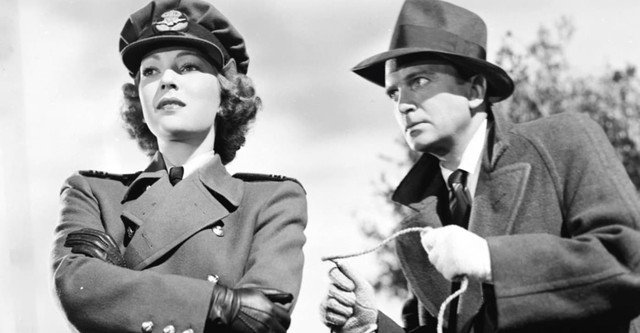
The Brighton Strangler (1945)
“There will be no New Year for you! You’ll go out with the old one!”
Warning! This film is NOT BRITISH, and was reviewed by mistake! It is quite good though...
〰️
Warning! This film is NOT BRITISH, and was reviewed by mistake! It is quite good though... 〰️
Occasionally, these black and white afternoon matinee films from the 50s sneak up on you and grab you around the throat. You’re expecting a twee little tale of trilby hats, long skirts, rationing and big old Jags, and the telly delivers up a vaguely disturbing tale of psychosis and murder to enjoy after Doctors and before Tenable. Of course, in the case ofThe Brighton Strangler the title rather gives the game away, but it still retains the power to shock. Or if not “shock” exactly, keep you on your toes.
The tale begins at a lick, with a shady chap menacing a young girl. “Who am I?” he demands. “Why… you’re Edward Gray!” the girl replies, only to get menaced a little further. “There will be no New Year for you!” he tells her, as the clocks begin to chime. “You’ll go out with the old one!”
Edward Gray is the Brighton Strangler, and his wide-eyed victim is in serious trouble. But luckily (for her), Scotland Yard is on the case – and Gray is chased, caught and shot by Her Majesty’s finest. “Well,” comments a nearby Cockney. “That’s the end of the Brighton Strangler.”
Fantastic – all loose ends tied up and the girl saved, and all a lot quicker than usual! Hang on a minute – did I fall asleep? Even for a “quota quickie”, that seemed a bit rushed. Where’s the character development? Where’s the obligatory song and dance routine? Hang on a minute – the film hasn’t finished at all!
We’ve just been watching a play within a film, with an actor called Reginald Parker (John Loder) playing the part of Gray. To the public, Parker is Gray, but he’s had enough of being a popular nutcase and wants to spread his artistic wings. Unfortunately, straight after his last performance, the theatre is bombed (it’s the height of the blitz) and Parker’s unprotected head is visited by most of it. Waking up in the rubble, he develops a far-away look in his eye and staggers off into war-torn London. Eventually, he finds himself at Victoria Station, where he spies a sign for Brighton and follows a young woman onto the train.
Making friends with the woman (June Duprez), whose name is April Manby, Parker introduces himself as Edward Gray. With a bit of smooth talking he manages to inveigle his way into her life, and on arrival at Brighton, he’s practically one of the family. Parker/Gray now begins to act out scenes from the play for real, beginning by tracking down Brighton’s mayor and murdering him on cold blood. Chief Inspector Allinson is put on the murder case, and suspicion soon falls on the smooth-talking new addition to April’s social circle. But because April has recently secretly married an American pilot and wants to keep this secret from her family and friends, she keeps unwittingly giving Parker/Gray an alibi. Eventually, the murderer manages to despatch the Chief Inspector as well, and is about to do the same to April when she mentions that it’s nearly New Year and he realises he’s in the wrong place – in order to fulfil his destiny, he should be in London as the clocks chime, with his hands round April’s throat.
Meanwhile, April’s husband (who is already in London) has begun to work out exactly what is going on. He spots a poster with Parker’s face on it, and a very helpful waitress fills in the rest of the blanks. Parker is presumed dead in the blast, but she did see him in the part once. “He gave me the shivers, but I loved it!”
Real life now imitates the stage version shown at the beginning of the film, with the police racing to rescue April as Parker repeats his roof-top speech. But as the cops advance on him, guns drawn, he seems to snap out of his reverie. “Don’t shoot!” he cries, “Applaud! Applaud!”
The Brighton Strangler is a surprisingly grim little tale, with some brutal murders (the mayor’s death is particularly affecting) offset with a lot of dark humour. There’s also a strange line in post-war propaganda – April’s heroic brother was shot down in his Spitfire, London is full of cheery ARP wardens and posters of Churchill, and everyone seems determined to make the best of it. Even Parker’s eventual comeuppance has a strange comedy to it.
